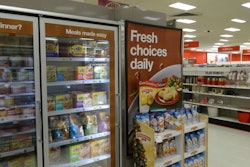
Target Corp is cracking down on suppliers as part of a multi-billion dollar overhaul to speed up its supply chain and better compete with rivals including Wal-Mart Stores Inc. and Amazon.com Inc., according to Reuters
The sixth-largest U.S. retailer by sales plans to tighten deadlines for deliveries to its warehouses, hike fines for late deliveries, and could institute penalties of up to $10,000 for inaccuracies in product information, according to a letter sent to suppliers and obtained by Reuters and an interview with Target's chief operating officer John Mulligan.
The moves, effective May 30, are the first major steps Target has taken since Mulligan was appointed as COO late in 2015 to fix supply problems that emerged after it expanded product offerings, including fresh food, several years ago.
A tighter grip on its deliveries is seen as crucial to keeping shelves stocked, maximizing sales and controlling costs. Target has already announced an investment of over $5 billion in supply chain and technology infrastructure between 2015 and 2017.
Editors Insight: Target’s actions are one more sign of the bar being raised on logistics providers. In February, Walmart told suppliers it was raising its standard for on-time delivery to 95 percent from 90 percent. Walmart is also cutting the window for deliveries to within 1 to 2 days of a target date, depending on the product category, from 1 to 4 days previously. Rest assured that Target and Walmart competitors will not be cutting suppliers more slack in meeting delivery performance standards.
The retailers are well aware of the capabilities that technology provides logistics companies. Attend any logistics software user conference, and retail supply chain executives will be present with notepads and recorders in hand.
One retail analyst noted that Target is aware of the fact that faster deliveries are now possible and the company intends to hold less inventory while keeping its shelves fully stocked.
Target’s new mandates apply to all classes of merchandise, but food is a key focus. The company's supply chain became more complex several years ago when it expanded its offering of perishable goods such as meat, fresh produce and dairy products.
In early November, the company announced it is considering partnering with outside companies to improve what its unreliable fresh food supply chain, Food Logistics reported.

















